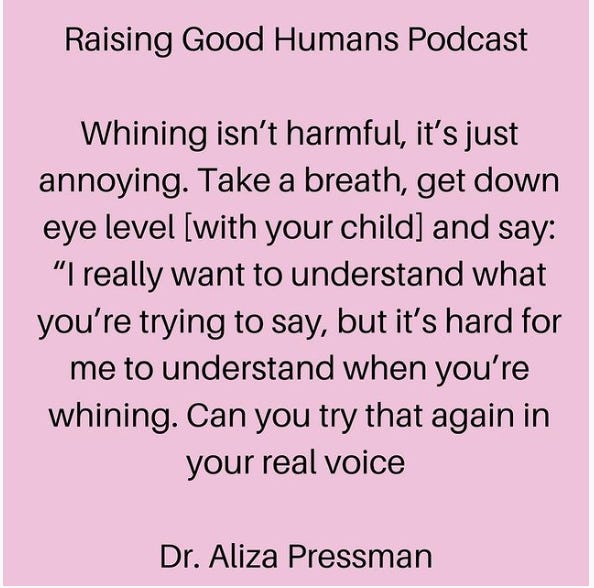As parents, we all complain about whining. We whine about whining. I’m always asked about how to handle the constant whines - and the follow-up questions from a recent post on IG make it clear there is more to say.
The post:
The extra challenge:
Whining is most of us a little nuts. To make sure you can keep it together when you hear the whining (remembering that our children co-regulate with us, so if we are bubbling over with irritation we will likely water the whining plant), try taking a breath before you respond to it. Just one breath (or a nice 4-count breath) can help you to respond with intention, not out of annoyance. When you take a breath, say to yourself, “This is annoying but not harmful” or something that reminds you not to lose it.
The follow-up:
One question I got after the post was about what to do after you have acknowledged them, prompted them for that “real” voice, and they still JUST KEEP GOING. This is the question I get the MOST about so many of the topics we talk about. You can do everything I suggest (or anyone out there) and it DOESN’T mean the behavior will stop. Especially not the first time and especially because we are investing in raising our kids which is not about a one and done moment. After you have been sensitive, handled it with that breath, and said it ONCE, it is perfectly OK to move on. You don’t have to ignore your child, but you can ignore the request. For example, once you have said that there is no ice cream for breakfast, and asked your child to tell you what they would like in their “real” voice, you can move on with the meal and avoid any more engagement around their whining (which is still happening while you breathe to yourself and repeat your own mantra). You can calmly move on from any discussion about the ice cream (like your long rationalization on why ice cream doesn’t usually match with 7am meals). You can carry on, talk about the weather, talk about what else you are doing that day, and change the channel on the conversation. That isn’t depriving them of your connection or your attention - or invalidating their feelings. You connected and validated in your initial response, now it's just getting on with the day and maintaining a decision you’ve made.
I hope this helps, and that the day is filled with “real” voices and lots of ice cream after lunch.
Warmly,






You start with saying, "I am happy to help you but I can't understand you in that voice. Can you find another way to ask me (this is assuming your child is old enough to have the words to ask you)?" Often just this prompting will get them to switch out of whining, because they know how to do it! If not, you can give your child attention about other things, talking about the weather, school, breakfast, but wait for the particular request to come in a non-whining voice. You are not ignoring them entirely, and you're calm, at the ready to help if they can use their other voice.
This still doesn't feel complete for me -- what does it look like to not ignore my child but ignore the request? If I ignore the request and they continue to whine, and then I continue to ignore them, it will move from whining to crying and screaming and whining, I know normal for little kids. Do you recommend completely ignoring them? And the biggest challenge -- what if it's for a reasonable request? What if they are whining that they want more water or help with something they actually need help with and then go into a full blown melt down because they aren't getting what they clearly need and I clearly heard them but I'm tired of the whining?